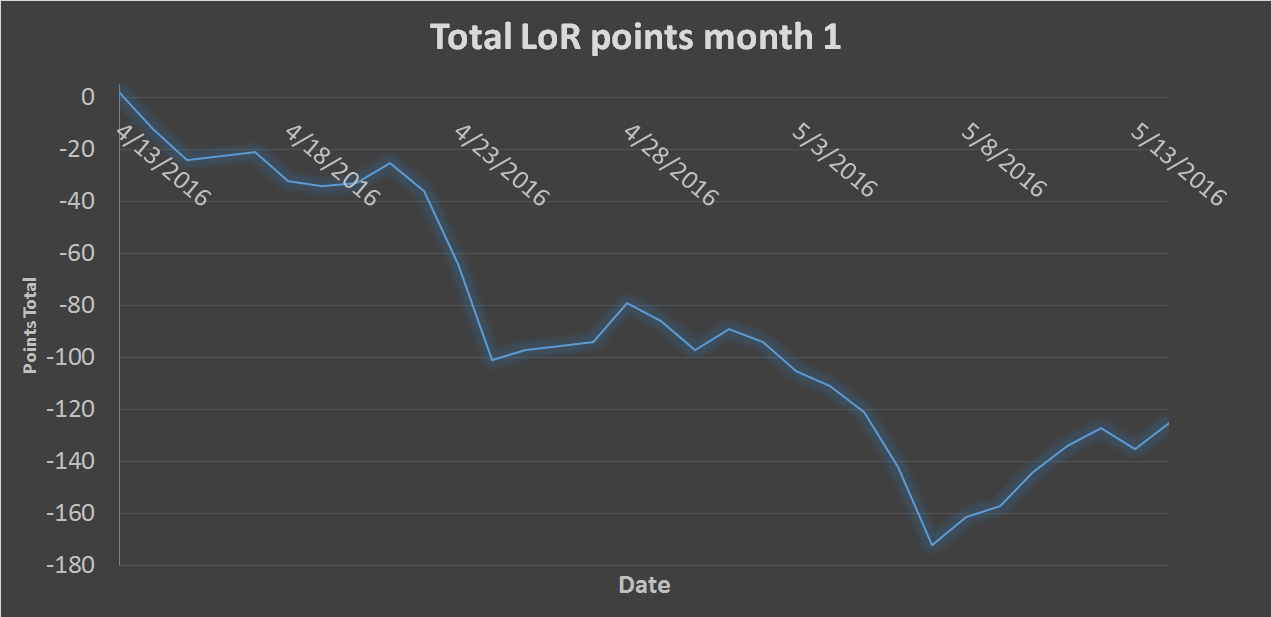




First Last Next Home
General Update 5/30/16:
Years ago, I started this website so I could showcase my comics. I was really into Web comics at the time and wanted to try my own hand at it. I've made a couple comics since then but it's never really been rehashed. Actually, the site was down for a long time since its original url of mongercomics.com. I brought the content back up under the current url, not so much because I wanted a comic page, really it was because I wanted any page. I wanted to have a sand box that I could experiment in. These days I don't get around to reading (let alone writing) comics. My hobby right now is amateur programming. I've displayed that a little bit with this page. Mostly the programming I do is visual Basic in excel. And most recently, I've become completely engrossed in the android app tasker.
I got involved in tasker because I was looking to find a better way to perform my new game. It's a point based system that I'm using to guide my motivations in everyday life. There's a lot of explaining for me to do here, so let's start with the game. Iíve titled this game: The Life of Riley, and my wife has titled it Vices vs Virtues.
Motivation
I spend a lot of time thinking about how I can run my life better. A lot of this time is while I'm in the car, and some of it is while listening to what I consider inspirational podcasts like this Freakonomics episode. This episode does a good job of exemplifying the idea that culminated during one of my morning commutes. One of the things holding me back, as far as I saw it, was that I'd get inspired to do something, and then I'd let it trail off. Or I'd be inspired in the morning, and less inspired at night when I actually had time to carry-out my inspired projects. For example, in the morning I'd decide to work on my web page when I get home instead of cracking a beer. But when I walk in the door that beer starts sounding real good. Or Iíd decide to start exercising every day, and then Iíd forget to do it after just a few days. Actually, I had recently decided to start doing 10 pushups every day, and if I was extra motivated Iíd make them incline pushups. I figured that if I at least did a little something each day, it would put me in the mind-set to do more. I was actually keeping up with this really well somehow. Iíd miss a day here and there, but not many. And then I started getting a really stiff neck and I blamed the incline pushups. What I needed, I figured, was a more rounded suite of workouts. And I needed a better way to keep track of whether I did them or not. What if there was a way, I thought, that I could award myself some kind of good karma type credit for doing these little work-outs, and lose points when I donít do them. I realized that this might actually work. And although I felt like the points themselves should be worth something that I could trade them in for, I couldnít decide what that would be, and it wasnít actually a necessity. For now, the points themselves are the means and the end. Itís like trying to get the high score on a video game. It doesnít mean anything, but I might try really hard to get it. This is where it started, and Iíve been refining it since.
Trial Month
I decided that the first month would be a trial month. Wherever I ended up at the end of that month would revert to zero at the end. I was making a lot of tweaks as I went along so it made sense not to take these initial points too heavily. When I first started I really thought that I was making it too easy on myself. And then I watched my points slowly (and sometimes quickly) decline. I wanted to get them back up, but felt like I hadnít really given myself a lot of opportunities to gain points, and a few drinks here and there would really add up for negative points. As the month went on I came up with some more ways to gain points. By the end, my points were turning up. OK, weíre about ready to get to the point rules. Here is a graph of the points from month 1. Note that it starts and ends mid-month. There was a bachelor party and a wedding in there that really threw me off.

The Rules of The Life of Riley: Vices Vs Virtues
Here is the slightly simplified set of point rules. For a more detailed explanation see here.
These are the rules at the start of and throughout month 2.
+1: The daily workout (there are a bunch of rules around the workout and opportunities for more points)
-1: One day late on the workout
-2: Two days late for the workout
-2: One cup of coffee
-2: One alcoholic drink
+5: 30 minutes on a project (limit 2/day)
+5: 15 minutes of meditation (limit 1/day)
-5: Night out playing volleyball
+1: Cartoon drawing (limit 2/day) (I have a separate project involving cartoons . . . and chemistry)
+1: Written explanation for the cartons (limit 1 /day)
+2: Two 3 minute back stretched (limit 1)
-2: Missed back stretches
-5: Night out without family
+5: Balance the books in Goodbudget
+1: car ride without podcast (limit 1/day)
-2: overeat
+5: submit an idea that I was nervous about
+2: 10 minutes reading and playing music (limit 1/day)
+1: 10 minutes playing music unscripted (limit 1/day)
-1: sweet
-5: headache from drinking
-25: full on hangover
-1: Nintendo
-5: Super Nintendo (this is code)
+1: Write a goal
-2: cigar
-2: 30 min of Starcraft II (this really is Starcraft II)
+1: read a short article
+2: read a long article or chapter
+1: 3 glasses of water (limit 1/day)
+5: post to website (chaóching)
+1: record a positive memory for the day
Brief Synopsis
As you read over this list, you were probably thinking about how oddly specific it was to my life, and how it wouldnít make any sense to use these same rules for yours. And yeah, thatís why Iíve completely developed this myself instead of buying one of these apps that makes a game out of your life. That would be nice, but I want it totally customized. Which is why tasker works with it so well. But Iíll talk about tasker in a moment. There is so much I could say about these rules, and what each one means to me and how it actually affects my life. So Iíll just briefly rattle on about a few of them. Volleyball, youíll notice, is negative. I donít actually consider it a vice, more like itís a reward. If I get a bunch of points, Iíll have some to spend on volleyball. Some of these onesy twooseys I try to hit each day. The goal, and the positive memory are easy points. Actually I just listened to another Freakonomics podcast about how just writing the goal down isnít the full story, and Iíve worked this into my system. Does it keep me from overindulging in beers? I wouldnít necessarily say that, but I am a lot more aware of each one I have, so it does feel like itís doing something. It definitely helps me keep up with exercises and the back stretches that my chiropractor assigned to me. I donít think thereís any other way that I would have stayed on top of these back stretches. Somehow, the fear of negative points for a late workout or stretch are much more of a motivator than the positive points even if I could have spent that time getting more positive points with less effort. So I might work in more negative points in if I donít play any music for 7 days in a row. You might ask if I think that this system is really helping my life. In some ways I think that it is. It gives me an extra tool that I can customize that helps shape and mold my behavior. While Iím less sure about how much it makes me avoid vices (I think it does something), it at least makes me take part in positive activities. I try to do the goal and positive memory every day. In some ways I feel like it distracts me from things I should really be doing but didnít want to assign any points to. Spending time with my 9 month old daughter is, of course, more important than any of these other points combined, and it would cheapen our shared experience if I gave myself points for it. So I have to put the points game aside when weíre hanging out and squeeze them in when I can.
The interface
When I started this system, I kept a list in google keep of all the rules and the points I obtain throughout each day. I love google keep for what it is, but it wasnít the most efficient way of keeping track of these points. I started looking around for apps that would help me count things with the least amount of effort and stumbled onto tasker pretty early on. It wasnít until month 2 that anything started to come together for it. As I mentioned, amateur programming is my hobby these days, and I realize that I really enjoy it. So when I finally started to get tasker, the interface took off and Iíve been on it pretty constantly trying to get everything tuned up. Thereís a lot that I still want to do but I feel likes thereís always more you could do with Tasker. Tasker is an app that lets you program tasks that your phone will do based on rules that you define. One thing I use it for is to send a txt to my wife when Iím on my way home based on the cell towers that my phone connects to and the time of day. The application of Tasker to LoRV3 is all based on button clicks. Iíve created a shortcut on my phone homescreen which opens what Tasker calls a Ďsceneí. In this case, it displays a series of buttons which Iíve assigned poorly and hastily done drawings to as well as a task.
The task, at minimum, is to write to a text file what Iíve done to warrant positive or negative points and log the time. At the end of the day, I have another task built in that tallies all my points. Thatís the gist of it. This alone may not seem like much, but itís taken me a long time to put it together. The counting part, for example, probably could have been done more easily but I ended up adding in a couple nested loops to match up rule names with point assignments between a daily point text file and one that stores the point assignments for each. For some of these point rules Iíve had a little extra fun. I decided that my goal for each day, should alternate in scope based on the day of the month. Days ending in 1 and 6 are 24 hr goals, days ending in 2 and 7 are 2 week goals and so on. One of the scenes shows a text field
which I can edit to write down the goal. It tells me which time frame I should do based on which day it is. Then it saves that goal with the date of when that goal should be realized. When that day comes, tasker will pop up what I had as a goal for that day. So if I make a goal for tomorrow, then tomorrow morning tasker will pop up a notification for what that goal was. If itís a 20 year goal I may never see it unless Iím still doing this system and using tasker. Alright, so thatís a pretty lengthy post. I canít believe I only get 5 points for it. Actually Iím timing my work and double dipping for project time points and Iíll give myself another 5 points for posting the detailed list of rules. I could have split the posts up for more points but I thought it should all go together. Iíll probably follow up with some more updates as I go along. I need those points. If youíve got questions or comments let me know at slobmonger@gmail.com.
As a parting comment, Iíll mention that this is not the first time Iíve decided to record events in my life for personal study (see reddit post and article) . But I think Iím a little more set up to do it this time around.
Monger out

